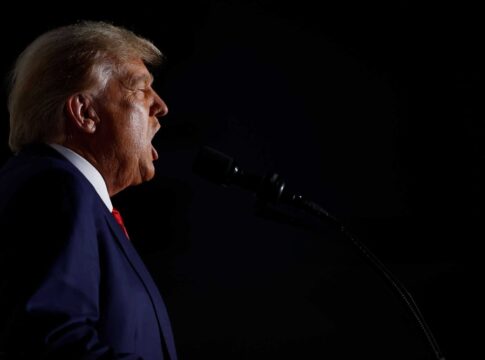Tesla CEO Elon Musk lashes out at Trump trade adviser Peter Navarro, calling him a “moron” as tensions over tariffs and manufacturing expose deep rifts within the MAGA coalition. Tesla ranks high in American-made content according to industry studies, with four models in the top 10 most American-made vehicles in 2023. Musk lost billions as markets reacted negatively to Trump’s tariff announcements. The dispute highlights fundamental disagreements over trade policy within Trump’s circle of supporters.
Fiery Exchange Reveals MAGA Movement Fractures
The conflict between tech billionaire Elon Musk and former Trump trade adviser Peter Navarro heated up when Navarro questioned Tesla’s American manufacturing credentials. Navarro claimed Tesla vehicles rely heavily on parts from China, Japan, and Taiwan, implying Musk is not a true manufacturer but rather a “assembler” of foreign components. This characterization struck a chord with Musk, who responded with uncharacteristic candor about a member of Trump’s inner circle despite his recent support for the president.
Musk quickly defended Tesla’s American manufacturing record, citing Cars.com studies that consistently show Tesla vehicles as among the most American-made. “By any definition, Tesla is the most vertically integrated automaker in America, with the highest percentage of US content,” Musk stated, directly contradicting Navarro’s claims. The 2023 Cars.com study ranked four Tesla models among the top ten most American-made vehicles, though the company’s ranking fell slightly in 2024.
US tariff policy has exposed divisions in Trump's administration, highlighted by a public clash between Elon Musk and trade advisor Peter Navarro. Musk, a tariff critic, called Navarro “a moron,” while Navarro dismissed Musk as “a car assembler” reliant on imports. #Tariffs pic.twitter.com/lYNbPaUob3
— WatchTower 环球瞭望台 (@WatchTowerGW) April 9, 2025
Economic Perspectives Conflict
Beyond personal insults, the confrontation reflects a fundamental disagreement with Trump’s trade policies. Despite his political support for Trump, Musk has openly criticized the former president’s tariff policies, particularly the impact on Tesla’s operations and stock value. Market reactions to Trump’s tariff announcements are said to have cost Musk billions of dollars, contributing to the worst US stock market trading week in five years. The Tesla CEO has advocated for zero tariffs between the U.S. and Europe, positioning himself as an advocate for free trade.
“Navarro is dumber than a sack of bricks. Navarro is truly a moron. What he says here is demonstrably false.” – Elon Musk
Navarro, a longtime champion of protectionist trade policies, dismissed Musk’s concerns as self-serving, suggesting they stem from Tesla’s reliance on inexpensive foreign components. While some industry experts acknowledge Tesla’s use of certain Chinese parts, they confirm that the company manufactures critical components like motors and batteries domestically. The dispute highlights the complex reality of global supply chains in modern manufacturing, where few products are made entirely in one country.
‘Dumber than a sack of bricks': Elon Musk calls Trump’s trade adviser a ‘moron’ as tariff spat gets messy. pic.twitter.com/pPTp64J94n
— Marketing Maverick (@MarketingMvrick) April 8, 2025
Trump’s Trade Strategy has Other Potential Results
The public disagreement between two prominent figures in Trump’s orbit underscores tensions within the Republican economic policy framework. Trump’s administration has defended its aggressive tariff approach, with U.S. Trade Representative Jamieson Greer claiming the strategy is already yielding positive results as various countries seek new trade deals. Several nations have reportedly offered to reduce their own tariffs, while companies have announced significant new investments in American manufacturing in response to the changed landscape.
“When it comes to tariffs and trade, we all understand in the White House – and the American people understand – that Elon is a car manufacturer, but he’s not a car manufacturer. He’s a car assembler.” – Peter Navarro
Republican lawmakers have remained cautious but optimistic about the long-term effects of Trump’s trade policies, despite economists warning that higher tariffs could exacerbate inflation, risk a recession, and raise costs for American families. Trump has shown no signs of backing down, threatening additional tariffs on China and dismissing the possibility of a trade deal with the European Union. The president has also actively opposed legislative efforts to limit his ability to impose tariffs, indicating his determination to maintain an aggressive trade posture.
Trump resolves the conflict
Despite the open conflict between his trade adviser and one of his most visible supporters, Trump has carefully managed his relationships with both. While continuing to advance Navarro’s tariff policies, Trump has publicly praised Tesla as an American-made car and referred to Musk as a “patriot.” This balancing act reflects Trump’s recognition of Musk’s significant support as well as the popularity of protectionist trade policies among key constituencies.
The dispute between Musk and Navarro is more than just a personal disagreement; it encapsulates fundamental tensions in American economic policy debates over globalization, protectionism, and the future of American manufacturing. As Trump’s trade policies continue to reshape international commerce, internal disagreements within his coalition highlight the complex tradeoffs that come with navigating the global economy. The outcome of this conflict could determine the direction of Republican trade policy for years to come.


